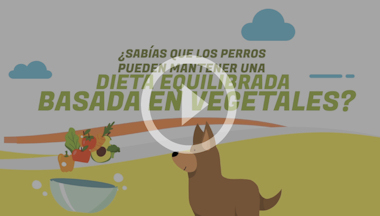
Formulated by veterinarians,
supported by science

Formulated by veterinarians and nutrition experts

Hypoallergenic. Does not contain meat allergens.

Plant-based. 100% plant-based.

Protein of high biological value

Cruelty-free. 100% plant-based.

Environmentally friendly
Green Pet Benefits
Green Pet Benefits
Plant-based dog food
eliminates the impact of the meat industry

92
%
lower land consumption

61
%
lower water consumption

85
%
less greenhouse gases

0
%
No antibiotics
Plant-based dog food
eliminates the impact of the meat industry

92
%
lower land consumption

61
%
lower water consumption

85
%
less greenhouse gases

0
%
No antibiotics
Frequently Asked Questions
Frequently Asked Questions
Are dogs carnivores?
Many people think that dogs require meat in their diet, but there is scientific evidence to show that dogs thrive on plant-based diets (7, 11, 31, 54). In fact, some of the oldest living dogs on record were fed entirely plant-based diets, such as Guinness World Record holder Bramble, who lived to be 25 years old (16, 17). In a study reported by famed veterinarian and professor of animal welfare at the University of Winchester Dr. Andrew Knight, the average lifespan of plant-based dogs was reported to be almost 13 years (11), which is above average (32) and in certain parts of the world, such as India and Sri Lanka, dogs have also thrived on plant-based diets for generations (18).
Additionally, a recent peer-reviewed study that monitored thousands of dogs ate various diets found that those on vegan diets lived up to 18 months longer than those on conventional meat-based diets ( 54 ). Another research group found that dogs eating vegan diets required fewer lifelong medications and needed to visit the vet less frequently for health problems ( 55 ).
There’s now even data to show that plant-based dogs experience health benefits that their meat-eating counterparts don’t, such as improvements in gut health, resolution of skin complaints, and reductions in anxious behaviors like aggression (59). One study also showed that dogs suffering from vitamin D deficiency after being fed a variety of popular meat-based diets saw a resolution in their deficiency after switching to a veterinary-certified vegan dry food diet (72). The take-home message is that dogs don’t require meat, they need protein, but this can also come from delicious plant-based sources (4, 5, 6, 31).
Are plants proteins digestible for dogs?
Absolutely yes, studies that have analyzed how much protein dogs can absorb from plant-based and fungal foods like soy and yeast have shown over 75% digestibility, which is on par with meat-based foods (23, 24, 25, 34, 35, 64-69). Both protein sources also contain all 10 essential amino acids (36, 37) that dogs should thrive on.
What are the benefits of plant-based protein food?
Multiple health benefits have been reported for dogs on plant-based diets, such as improved weight control, decreased incidence of cancer, decreased infections, regression of diabetes, and improved skin/coat quality and odor (11). Additionally, a recent peer-reviewed study found that guardians who fed Omni for up to a year found their dogs showed improvements in stool consistency, skin and hair condition, and even reductions in anxiety and aggressive behavior (59).
Clinical signs related to food allergies and intolerances in dogs can include itchy ears, hair loss, red skin, paw licking, fluid deposits, and vomiting (38). Animal proteins like beef, chicken, and dairy are relatively common allergens in dogs (39), so plant-based diets, naturally, might also be a good option to consider for these pets. In addition to plant-based dogs potentially living up to 18 months longer (54), a recent study showed that plant-based diets may be the healthiest and least dangerous for dogs (55).
What does it mean tha GreenPet is a sustainable product?
It’s been reported that the world’s 500 million dogs and cats eat 20% of the planet’s meat. This is estimated to produce 64 million tons of CO2 and methane in the United States alone. To put that in context, that’s the equivalent environmental impact of 13.6 million cars (53, 56)!
Plant-based dog foods have been shown to use up to 85% fewer greenhouse gases, consume 61% less water, and use 92% less land, compared to traditional meat-based diets. It has been estimated that switching a medium-sized dog from a traditional meat-based diet to a plant-based diet like Omni is equivalent to savings over a 20-year dog’s lifetime on an individual’s showers, 22 return flights from London to New York, and 348 tennis courts.
We also make dry foods that emit less carbon: squat-based dry foods are up to 7 times less carbon-emitting than wet or home-cooked diets. Animal-based proteins like beef and chicken were selected from among the most carbon-emitting ingredients (58).


































